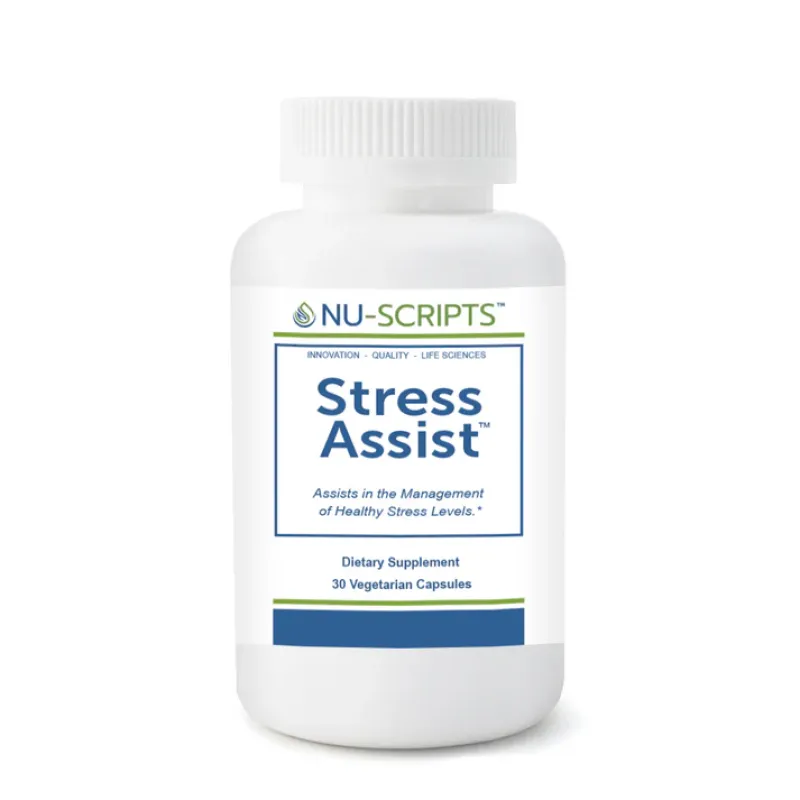Stress Assist
- $59.99
- Quantity Tier Pricing
- 2 or more $44.99
- 12 or more $35.99
Nutritional Modulation of Stress Response and Neuroendocrine Balance
Overview
Stress triggers a cascade of neuroendocrine, oxidative, and inflammatory responses, primarily mediated through the hypothalamic-pituitary-adrenal (HPA) axis.
The combination of these nutrients and bioactive compounds supports cellular energy production, neurotransmitter balance, antioxidant defense, and hormonal regulation, thereby enhancing the body’s capacity to adapt to and recover from stress.
Key Nutrient Contributions
1. Vitamin C
Primary Actions:
-
Acts as a potent antioxidant protecting neurons and adrenal tissues from oxidative stress.
-
Supports cortisol regulation, aiding in faster recovery of baseline cortisol after stress exposure.
-
Enhances catecholamine synthesis (dopamine, norepinephrine), improving focus and resilience under stress.
Clinical Insight:
Vitamin C deficiency is associated with fatigue and heightened stress reactivity; adequate levels restore adrenal efficiency and psychological balance.
2. Vitamin D
Primary Actions:
-
Regulates neurosteroid activity, modulating mood and HPA axis signaling.
-
Enhances expression of serotonin-synthesizing enzymes, supporting emotional equilibrium.
-
Exhibits anti-inflammatory and neuroprotective effects during chronic stress.
Clinical Insight:
Optimal Vitamin D levels correlate with reduced anxiety, improved mood, and lower cortisol variability, supporting balanced stress adaptation.
3. Thiamin (Vitamin B1)
Primary Actions:
-
Supports glucose metabolism in neurons, ensuring adequate energy during stress responses.
-
Protects against neuroinflammation and cognitive fatigue under chronic stress conditions.
Clinical Insight:
Adequate thiamin supports mental clarity and nerve resilience, mitigating stress-induced cognitive decline.
4. Riboflavin (Vitamin B2)
Primary Actions:
-
Facilitates mitochondrial energy production through FAD-dependent enzyme systems.
-
Supports regeneration of antioxidant molecules such as glutathione, buffering oxidative stress.
Clinical Insight:
Riboflavin sustains cellular energy and redox stability, both critical for managing physical and psychological stress.
5. Niacin (Vitamin B3)
Primary Actions:
-
Serves as a precursor to NAD⁺, vital for cellular energy and DNA repair under stress.
-
Modulates neuroinflammatory pathways and supports neurotransmitter balance.
Clinical Insight:
Niacin helps preserve neurological stability and calm during prolonged stress by enhancing NAD⁺-dependent resilience mechanisms.
6. Vitamin B6 (Pyridoxine)
Primary Actions:
-
Essential for synthesis of serotonin, dopamine, and GABA, neurotransmitters central to mood regulation.
-
Supports adrenal hormone synthesis and conversion of tryptophan to niacin.
Clinical Insight:
B6 optimizes neurochemical adaptation to stress, improving calmness and reducing anxiety.
7. Folate (Vitamin B9)
Primary Actions:
-
Required for one-carbon metabolism and methylation processes critical for neurotransmitter synthesis and DNA repair.
-
Supports homocysteine regulation, reducing neurovascular tension associated with stress.
Clinical Insight:
Folate supports emotional stability and cognitive function by maintaining optimal methylation balance during stress.
8. Vitamin B12 (Cobalamin)
Primary Actions:
-
Works synergistically with folate in methylation and myelin maintenance.
-
Supports red blood cell and energy metabolism to prevent fatigue under chronic stress.
Clinical Insight:
B12 deficiency contributes to irritability and low mood; supplementation supports neurological integrity and calm energy.
9. Biotin (Vitamin B7)
Primary Actions:
-
Supports fatty acid and glucose metabolism, ensuring steady energy supply during stress responses.
-
Maintains healthy nervous system function and mood balance.
Clinical Insight:
Biotin contributes to energy stability and mental resilience during stress adaptation.
10. Pantothenic Acid (Vitamin B5)
Primary Actions:
-
Integral for coenzyme A (CoA) synthesis, supporting adrenal function and energy metabolism.
-
Directly involved in cortisol synthesis and regulation, promoting balanced stress hormone levels.
Clinical Insight:
Known as the “anti-stress vitamin,” pantothenic acid supports adrenal recovery and sustained energy under prolonged stress conditions.
11. Calcium
Primary Actions:
-
Serves as a second messenger in neurotransmission, muscle relaxation, and hormonal regulation.
-
Modulates nerve excitability, supporting calmness and physical relaxation.
Clinical Insight:
Adequate calcium promotes neuromuscular stability and helps prevent overstimulation during stress.
12. Lunasin
Primary Actions:
-
A bioactive soy peptide with epigenetic and anti-inflammatory properties.
-
Modulates gene expression related to oxidative stress and cellular protection.
-
Supports cortisol balance by improving cellular resilience and reducing inflammatory cytokine release.
Clinical Insight:
Lunasin enhances cellular stress tolerance and recovery, complementing nutrient-based antioxidant defenses.
13. Pyrroloquinoline Quinone (PQQ)
Primary Actions:
-
Potent redox cofactor and mitochondrial biogenesis stimulant.
-
Protects neurons from oxidative injury and supports neurotransmitter balance.
-
Enhances energy metabolism and reduces fatigue associated with chronic stress.
Clinical Insight:
PQQ supports mitochondrial renewal and neuronal protection, restoring cognitive and physical vitality during stress adaptation.
* Please be aware that packaging displayed on our website may vary from your order based on factors such as availability and supplier changes, or to improve the readability of product details.
* These statements have not been evaluated by the Food and Drug Administration. This product is not intended to diagnose, treat, cure, or prevent any disease.
Tags: stress assist , nu-scripts stress assist , nuscripts stress assist ,






